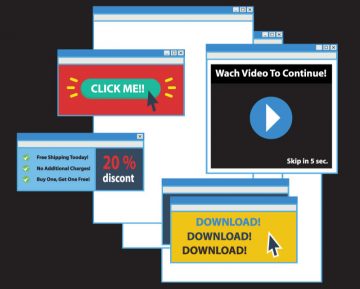ResourceActivity Adware

ResourceActivity, a ad-supported Mac app, also known as adware. It belongs to the Adload family, known for its numerous similar variants. However, this adware exhibits additional harmful characteristics, including browser hijacking and robust persistence mechanisms.
The primary goal of the ResourceActivity adware is to saturate users with advertisements. To achieve this, it alters the homepage and new tab settings of browsers like Safari, compelling users to utilize alternative search engines. These manipulated search results often include numerous unsafe commercial links prominently displayed.
As a result, users are more susceptible to encountering various intrusive advertisements, including pop-ups, banners, in-text links, and auto-playing videos, during their internet navigation. This not only disrupts the browsing experience but also elevates the risk of exposure to potentially harmful content.
How Can Adware Get Inside Your Mac?
Adware can find its way onto your Mac through various channels and methods. Here are common ways adware may get inside your Mac:
Bundled Software Installers:
Adware often comes bundled with seemingly legitimate software. When you download and install freeware or shareware from untrustworthy sources, the adware may be included in the installation package. Always download software from official and reputable websites.
Fake Software Updates:
Adware may be disguised as fake software updates or patches. Users may unknowingly download and install these updates, thinking they are legitimate system or application updates. Stick to official sources for software updates.
Malicious Websites:
Visiting malicious or compromised websites can expose your Mac to adware. Some websites may use deceptive tactics to prompt users to download and install adware, claiming it is necessary for viewing content or improving security.
Phishing Emails and Malicious Links:
Clicking on links or downloading attachments from phishing emails can lead to the installation of adware. Scammers may use social engineering techniques to trick users into taking actions that result in adware infections.
Peer-to-Peer (P2P) File Sharing:
Downloading files through peer-to-peer networks or torrents may expose your Mac to adware. Files obtained from these sources may contain bundled adware or other unwanted software.
Fake Flash Player Installers:
Adware may disguise itself as fake Flash Player installers. Users who download and install these fake installers may unknowingly introduce adware onto their systems. Always download Flash Player directly from Adobe's official website.
Drive-By Downloads:
Adware can be delivered through drive-by downloads, where malicious code is automatically downloaded and executed when you visit a compromised website. Keeping your browser and system updated can help prevent vulnerabilities that may be exploited for drive-by downloads.








